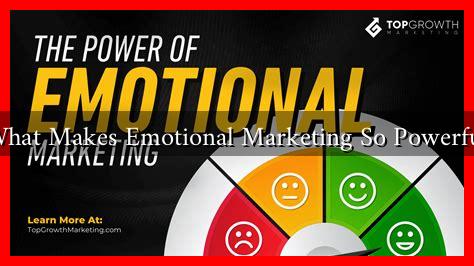-
Table of Contents
What Makes Emotional Marketing So Powerful
In the ever-evolving landscape of marketing, emotional marketing has emerged as a potent strategy that resonates deeply with consumers. By tapping into the emotions of their audience, brands can create lasting connections that drive engagement, loyalty, and ultimately, sales. This article explores the power of emotional marketing, its effectiveness, and how brands can leverage it to their advantage.
The Psychology Behind Emotional Marketing
Emotional marketing is rooted in the understanding that consumers often make decisions based on feelings rather than logic. According to a study by the American Marketing Association, emotional responses to advertisements can significantly influence consumer behavior. Here are some key psychological principles that underpin emotional marketing:
- Emotional Triggers: Emotions such as happiness, sadness, fear, and nostalgia can trigger specific responses in consumers, making them more likely to engage with a brand.
- Memory Retention: Emotional experiences are more likely to be remembered. Brands that evoke strong emotions can create lasting impressions that influence future purchasing decisions.
- Social Connection: Humans are inherently social beings. Emotional marketing fosters a sense of community and belonging, which can enhance brand loyalty.
Examples of Successful Emotional Marketing Campaigns
Many brands have successfully harnessed the power of emotional marketing to create impactful campaigns. Here are a few notable examples:
- Always – #LikeAGirl: This campaign challenged gender stereotypes and empowered young girls, evoking feelings of pride and confidence. The emotional resonance of the message led to widespread sharing and increased brand awareness.
- Coca-Cola – Share a Coke: By personalizing their product with names, Coca-Cola tapped into the emotions of connection and nostalgia, encouraging consumers to share their experiences with friends and family.
- Google – Year in Search: Each year, Google releases a video summarizing the most searched topics, often highlighting human stories of triumph and resilience. These videos evoke a range of emotions, from joy to sadness, making them highly shareable.
The Impact of Emotional Marketing on Consumer Behavior
Emotional marketing not only influences consumer behavior but also drives measurable results. Research indicates that:
- Advertisements that evoke emotions can increase purchase intent by up to 23%.
- Emotional connections can lead to a 306% higher lifetime value for customers.
- Brands that prioritize emotional engagement see a 33% increase in customer loyalty.
These statistics underscore the importance of integrating emotional elements into marketing strategies. Brands that successfully connect with their audience on an emotional level are more likely to foster loyalty and advocacy.
How to Implement Emotional Marketing Strategies
To effectively leverage emotional marketing, brands should consider the following strategies:
- Know Your Audience: Understanding the emotions and values of your target audience is crucial. Conduct surveys or focus groups to gather insights.
- Tell Compelling Stories: Use storytelling to create narratives that resonate emotionally. Stories that evoke empathy or nostalgia can be particularly powerful.
- Utilize Visuals: Images and videos can evoke emotions more effectively than text alone. Invest in high-quality visuals that align with your brand message.
- Be Authentic: Authenticity is key in emotional marketing. Consumers can easily detect insincerity, so ensure that your messaging aligns with your brand values.
Conclusion
Emotional marketing is a powerful tool that can transform the way brands connect with their audience. By understanding the psychological principles behind emotional responses and implementing effective strategies, brands can create meaningful connections that drive engagement and loyalty. As demonstrated by successful campaigns, the ability to evoke emotions can lead to significant business outcomes, making emotional marketing an essential component of any marketing strategy. In a world where consumers are bombarded with choices, those who can connect on an emotional level will stand out and thrive.

